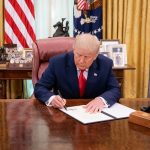There is a common perspective in mainstream media that suggests Donald Trump’s tariff policy will lead to inflationary pressure on consumers. However, this oversimplified view misses an important aspect of Trump’s approach: his tariffs are primarily a strategic tool designed to gain leverage in international negotiations, not merely a mechanism for raising prices. Contrary to the fears of many economists, Trump’s focus remains on creating results that favor American interests, and it’s unlikely he aims to burden the average American with excessive costs.
In the realm of foreign policy, a significant development is taking place between Israel and Lebanon. Reports indicate that a ceasefire has been established, but this arrangement is far from a comprehensive peace treaty. Instead, it acts as an interim solution, allowing Israel to regroup while navigating the treacherous waters of the current U.S. administration. This situation underscores a critical observation: foreign nations are increasingly making agreements not based on confidence in U.S. leadership but rather as a means to circumvent the current obstacles presented by the Biden administration.
The reality is that Israel has accomplished much of what it set out to do in its military operations against Hezbollah in Lebanon. The ceasefire agreement essentially provides a framework that allows Israel to respond if Hezbollah breaks the terms. When viewed through the lens of strategic necessity, this arrangement highlights a grave concern about the Biden administration’s foreign policy trajectory. The slow pace of U.S. aid to Israel has resulted in unnecessary casualties, putting Israel in a precarious position. Allies like Israel can hardly afford to wait for the U.S. to catch up when their survival is at stake.
The prevailing narrative suggests that President Biden’s approach to foreign policy is lacking strength and decisiveness, creating vacuums that adversaries may exploit. As allies adopt defensive postures to safeguard their interests, it becomes glaringly clear that what they truly desire is a return to stronger leadership—a leadership reminiscent of the Trump administration. The signature approach under Trump wasn’t just about establishing tariffs; it was about creating a clear signal to allies and adversaries alike: the U.S. will stand with its friends while pushing back against those who threaten peace.
Indeed, international allies are maneuvering through a complex geopolitical landscape, opting for strategic agreements that allow them to bypass the current administration’s erratic policies. It’s rather ironic that what should be strong, loyal partnerships with U.S. allies are being replaced with makeshift strategies designed for survival. As the world continues to watch the effects of Biden’s foreign policy unfold, one cannot help but wonder how long countries like Israel and Lebanon will have to hold their breaths, waiting for a shift back to a time when American leadership was synonymous with strength and reliability. Maybe then, the ceasefires can evolve into genuine peace rather than temporary pauses in warfare.




